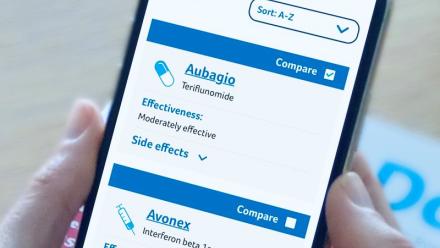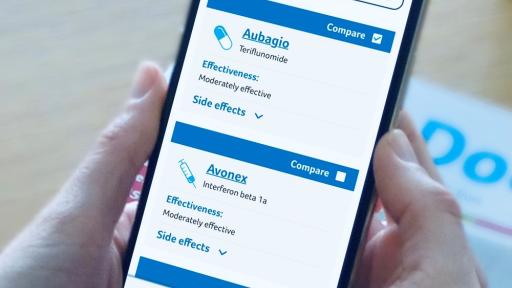Ocrevus (ocrelizumab) is a disease modifying drug (DMD) that is approved for relapsing remitting and for primary progressive MS.
You take Ocrevus every six months, either by infusion (drip) into a vein, or by an injection under the skin. In relapsing remitting MS, it reduces the number of relapses by about two thirds (70%). In early, inflammatory primary progressive MS, it slows the worsening of disability.
Common side effects include increased risk of infections, including herpes, influenza (flu) and other viral infections, infections of the skin, sinuses, respiratory tract, stomach and bowel.
What is Ocrevus used for in MS?
Ocrevus is a disease modifying drug for active relapsing remitting, very active relapsing remitting MS and early, inflammatory primary progressive MS. You have fewer relapses than you might have had without treatment, and disease progression is slowed.
Ocrevus is a highly effective (category 2.0) DMD; in clinical trials people taking Ocrevus had about 50% fewer relapses than people taking Rebif.
During the clinical trials, Ocrevus appeared to reduce disability progression and significantly reduce the number of lesions seen on MRI scans compared to Rebif. Brain volume loss was reduced and more people with no evidence of disease progression (NEDA) were seen in those taking Ocrevus compared to those taking Rebif.
During clinical trials, fewer people with primary progressive MS taking Ocrevus had an increase in disability; people taking Ocrevus were 24% less likely to have an increase in their disability than those taking placebo. In more real-life terms, this is equivalent to potentially delaying the need for a wheelchair by seven years for people with early, inflammatory primary progressive MS.
Ocrevus can be prescribed for adults with active relapsing remitting MS and very active relapsing remitting MS, if they are unwilling or unable to take Lemtrada.
Ocrevus can be prescribed for early, inflammatory primary progressive MS, defined as people who:
- have had symptoms of primary progressive MS for 15 years or less
- are able to walk 20 metres or more, with or without walking aids (up to EDSS 6.5)
- have evidence of MS activity on MRI scans
Ocrevus has been approved for use on the NHS since 2018. It can only be prescribed by a neurologist.
Ocrevus may not be appropriate if you have existing medical conditions including cancer or serious infections such as HIV/AIDS or hepatitis B.
Pregnancy is not recommended during treatment with Ocrevus. If you plan to start a family discuss your specific circumstances with your MS team.
Women of child-bearing age must use an effective method of contraception during treatment and for 4 months after stopping Ocrevus.
There are two ways to take Ocrevus.
If you are taking Ocrevus as an infusion into your veins (drip), this will take place in an infusion unit in a hospital or clinic.
The first dose is given as two separate infusions, two weeks apart. Further doses are given as one infusion every six months. The infusions take around 3 to 4 hours to complete.
You will be monitored carefully for signs of side effects (infusion reaction) for around an hour after the infusion. If you have an infusion reaction, the nurses giving the infusion may slow the infusion down or temporarily stop it. If you have had several infusions with no concerns, the monitoring time may be reduced.
If you are taking Ocrevus as an injection, this will be given by a doctor or nurse. It may take place in a hospital or another clinic or health centre.
The injection is given under the skin into your stomach area. The doctor or nurse giving the injection will make sure that the injection avoids the area around your navel (belly button) and areas where there are bruises, redness or tenderness, moles or scars. The injection takes around 10 minutes to complete.
You will be monitored carefully for signs of side effects (injection reaction) for at least an hour after the first injection. If you have an injection reaction, the injection process may be slowed down. Once you have had several injections with no concerns, the monitoring time may be reduced.
What side effects can I get with Ocrevus?
Many people treated with Ocrevus experience infusion reactions or injection reactions, depending on how they take the drug. These include symptoms like a rash, red or itchy skin, headache, fever, shortness of breath and nausea.
Infusion reactions and injection reaction are generally mild to moderate and temporary. To minimise your chances of getting these side effects, you will be given additional medications such as an anti-histamine and a steroid. Your health team will monitor you closely during and after the infusion or injection.
Other side effects include an increased risk of infections including coughs, colds, chest infections and herpes virus infections (such as cold sores or shingles)
Ocrevus suppresses part of the immune system so that you will be more vulnerable to infections such as colds and viruses. Your MS team should give you advice on ways to minimise the risk of infections.
You should tell your doctor or nurse straight away if you notice any symptoms of an infusion or injection reaction up to 24 hours after your Ocrevus dose has been given.
Common side effects (affecting more than 1 person in 100)
- infusion or injection reactions
- flu (influenza)
- sinus infections
- bronchitis (bronchial tube inflammation)
- herpes infection (cold sore or shingles)
- infection of the stomach and bowel (gastroenteritis)
- viral infections
- skin infection (cellulitis)
A full list of side effects is included in the manufacturer's Patient Information Leaflet.
Rare or serious side effects
Progressive multifocal leukoencephalopathy (PML) is a serious brain infection that can often be fatal. It can arise when the immune system in the brain and spinal cord is supressed to the extent that a previously dormant virus is able to cause disease. The risk of PML can carry over once you stop taking a drug that has a suppressive effect on the immune system, because it can take some months for the immune system to recover.
Up to June 2024, there have been 16 confirmed cases of PML in people taking Ocrevus, out of more than 350,000 taking the medicine worldwide. Of these, 12 of the cases were attributed to people taking natalizumab (Tysabri) or dimethyl fumerate (Tecfidera) before switching to Ocrevus. Alert your neurologist if you have new or worsening symptoms.
Read more about PML and the JC virus.
Assessment before treatment
Before starting Ocrevus, you will have tests to check for HIV and hepatitis B. Your white blood cell levels will also be checked. If you take medicine for high blood pressure, you may be asked to stop taking it for 12 hours before each infusion, as Ocrevus can lower blood pressure.
Assessment during treatment
Before each infusion you will be given a corticosteroid and an anti-histamine and you may also be given medicine to reduce fever. This is to reduce any infusion reaction. You will be closely monitored for reactions such as a rash or itchy skin, fever, nausea or headache. The infusion may be slowed, temporarily stopped or permanently stopped if you have an infusion reaction, depending on how serious it is.
Ocrevus is a monoclonal antibody, a type of drug developed to attack specific targets in the immune system.
Ocrevus has been designed to target a particular marker (CD20) on the surface of B cells, a type of white blood cell (lymphocyte) which is thought to be involved when the immune system attacks the myelin around nerve cells. The targeted B cells are destroyed.
Ocrevus research for relapsing remitting MS
Evidence for the effectiveness of Ocrevus in RRMS has come from two large studies:
Opera I and II - Ocrevus compared to Rebif (interferon beta 1a)
These phase III studies recruited 1656 participants with relapsing remitting MS who took either Ocrevus 600mg every 6 months or Rebif (interferon beta 1a) three times per week for approximately two years.
Over the two years of the clinical trials, Ocrevus reduced the number of relapses by 50% compared to interferon beta 1a, reduced disability progression sustained for 3 and 6 months, and significantly reduced the number of lesions seen on MRI scans compared to beta interferon. Brain volume loss was reduced and numbers of participants with no evidence of disease progression (NEDA) were increased in the Ocrevus treatment groups compared to interferon beta 1a.
Further research on Ocrevus for RRMS
Ocrevus in early stage relapsing remitting MS
This phase III study is recruiting 600 participants who have a diagnosis of relapsing remitting MS and whose first symptoms of MS occurred less than three years ago. All participants will take Ocrevus 600mg every 24 weeks by iv infusion for 192 weeks with a follow-up period of at least 48 weeks. The study will monitor a number of measures of MS activity, including disability worsening or improvement, relapses and lesions seen on MRI.
Estimated completion date January 2024.
Further details of this study.
Ocrevus research for primary progressive MS
Evidence for the effectiveness of Ocrevus in PPMS has come from one large study:
ORATORIO - Ocrevus compared to placebo
This phase III study recruited 732 participants with primary progressive MS and EDSS of 3 to 6.5 who took either Ocrevus or placebo by iv infusion every 6 months for more than 2 years.
The main measure of the study was the onset of disability progression. This was measured by the number of participants with an increased EDSS which was still evident 3 months later. The study also recorded the number of participants with an increased EDSS still evident after 6 months, walking speed over 25 feet and volume of brain and MS lesions.
Fewer people taking Ocrevus had an increase in disability, compared to placebo. An increase in disability which lasted 3 months was seen in 32.9% of those taking Ocrevus and 39.3% of those taking placebo. In addition, increased disability which lasted at least 6 months was seen in 29.6% taking Ocrevus and 35.7% taking placebo. Comparing the two groups, people taking Ocrevus were 24% less likely to have an increase in their disability than those taking placebo.
After 120 weeks of treatment, walking speed over 25 feet was 39% slower for Ocrevus compared to 55% slower for placebo. Brain lesion volume decreased by 3.4% with Ocrevus and increased by 7.4% with placebo. Loss of brain volume was 0.9% for Ocrevus and 1.09% for placebo.
Future research on Ocrevus for PPMS
ORATORIO-HAND (O'HAND)- Ocrevus compared to placebo
This phase III study is designed to evaluate the effect of Ocrevus on hand and arm function in people with more advanced disability, including those who use a wheelchair. The study will recruit approximately 1000 participants with EDSS between 3 and 8 and includes eleven study centres in the UK. The main measure of the study will be the nine-hole peg test, a measure of arm, wrist and hand function. A secondary measure will be onset of disability progression, measured by the number of participants with an increased EDSS which persists for 3 months or longer.
Estimated completion date April 2028.
Further details of this study.
Consonance - Ocrevus
This study is recruiting 900 people with either secondary or primary progressive MS. All participants will take Ocrevus every 24 weeks for four years. Progression of disability will be assessed using a combination of measures.
Estimated completion date January 2026.
Further details of this study.
-
National Institute For Health And Care Excellence (NICE)
Ocrelizumab for treating relapsing–remitting multiple sclerosis
NICE technology appraisal guidance TA533
Full guideline (link is external)
National Institute For Health And Care Excellence (NICE)
Ocrelizumab for treating primary progressive multiple sclerosis
NICE technology appraisal guidance TA585
Full guideline (link is external)
Hauser SL, et al.
Ocrelizumab versus interferon beta-1a in relapsing multiple sclerosis
New England Journal of Medicine 2017;376(3):221-234.
Full article (link is external)
Montalban X, et al.
Ocrelizumab versus placebo in primary progressive multiple sclerosis.
New England Journal of Medicine 2017;376(3):209-220.
Full article (link is external)


